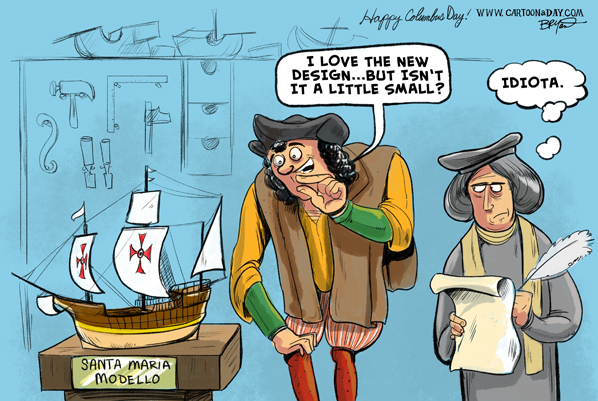

Even before he set sail from Spain, thousands of people were already living on these lands for centuries.

While it has been commonly said that Columbus discovered the Americas, that is not accurate. The fleet also came across other Caribbean islands on this expedition, including modern-day Cuba and Haiti, which Columbus believed were the Indies. After more than two months of sailing across the Atlantic Ocean, the fleet spotted what would eventually be known as the Bahamas on October 12, 1492. In August 1492, Columbus’s expedition set sail with three ships: the Niña, Pinta, and Santa María. Proponents of the Catholic Church, the monarchy also hoped the voyage would help spread Christianity into the East. The monarchy considered Columbus’s expedition as an opportunity to expand Spain’s trading network into the Indies’ lucrative economy. He persuaded King Ferdinand II and Queen Isabella I to sponsor his quest to find a westward route to China, India, and Japan-lands then known as the Indies. He died on a wealthy but disappointed man.Christopher Columbus was a 15th and 16th century explorer credited for connecting the Old World (Europe, Africa, and Asia) and the New World (North America and South America).īorn in Genoa, Italy, in 1451, Columbus made his way to Spain, where he gained support from the Spanish monarchy. A great navigator, Columbus was less successful as an administrator and was accused of mismanagement. Indeed, others began to dispute whether this was in fact the Orient or a completely 'new' world.Ĭolumbus made two further voyages to the newfound territories, but suffered defeat and humiliation along the way. More territory was covered, but the Asian lands that Columbus was aiming for remained elusive. He was made 'admiral of the Seven Seas' and viceroy of the Indies, and within a few months, set off on a second and larger voyage. Columbus landed on a number of other islands in the Caribbean, including Cuba and Hispaniola, and returned to Spain in triumph. Initial encounters were friendly, but indigenous populations all over the New World were soon to be devastated by their contact with Europeans. Believing that they had reached the Indies, the newcomers dubbed the natives 'Indians'.

On 12 October, Columbus and a group of his men set foot on an island in what later became known as the Bahamas. Finally, King Ferdinand and Queen Isabella agreed to sponsor the expedition, and on 3 August 1492, Columbus and his fleet of three ships, the Santa Maria, the Pinta and the Niña, set sail across the Atlantic. When this failed, and appeals to the French and English courts were also rejected, Columbus found himself in Spain, still struggling to win backing for his project.

It was here that he initially attempted to gain royal patronage for a westward voyage to the Orient - his 'enterprise of the Indies'. As a teenager, Christopher went to sea, travelled extensively and eventually made Portugal his base. His father was a weaver and small-time merchant. This unintentional discovery was to change the course of world history.Ĭhristopher Columbus was born in Genoa between August and October 1451. © Known as 'the man who discovered America', Columbus was in fact trying to find a westward sea passage to the Orient when he landed in the New World in 1492.


 0 kommentar(er)
0 kommentar(er)
